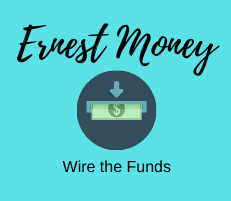No need to bring a check. Just wire the funds to the escrow company handling the transaction.
When you write an offer to buy a home, you typically need to show the seller you have skin in the game right away. This comes in the form of an initial deposit, also called an earnest money deposit.
What Is an Earnest Money Deposit?
As a homebuyer, you write an offer using a home purchase contract. This contract contains provisions about how you’re going to increase your commitment level as you move through the buying process.
This commitment starts with an earnest money deposit, named as such because it’s a deposit made in earnest or in good faith of your intent.
How Much Are Deposits & When Are They Paid?
Earnest money deposits are usually 1 percent to 3 percent of a home’s purchase price, depending on local custom and the pace of current market conditions (the faster the market pace, the higher the deposit). So if you were buying a $300,000 home, the deposit would be $3,000 to $9,000.
These deposits are typically due within three days of the buyer and seller agreeing to a purchase contract in writing. They can be paid all at once, or broken into two different phases as follows:
Phase 1 will typically be between $1,000 and $5,000, regardless of the home price.
Phase 2 will be the balance due after phase 1. So on a $300,000 purchase price with a required deposit of 3 percent, if you paid $1,000 in phase 1, the remaining amount due for phase 2 would be $8,000.
How Are Deposits Paid?
Whether deposits are delivered all at once or broken into two phases, during a virtual transaction, Ernest Money Deposits should we wired to the escrow company. Deposits aren’t held by the seller.
Deposits are held by the escrow company handling the settlement for the transaction. Your real estate agent can advise whether you’re in a state that settles home purchases using escrow companies or attorneys.
Do Lenders Track Deposits During Loan Approval?
Your loan approval process is running simultaneously as you’re paying your deposit(s), and because your lender will require that you document all real-time activity of all your bank accounts, they will require you to document payment of your deposit(s).
Your lender will require you to show copies of the wire transfer or cashier’s check to reconcile with your bank account statements and/or online transaction summaries, and they will also require the escrow company or attorney to show proof of those funds going into their account, as well as an earnest money deposit receipt.
Are Deposits Refundable?
Your purchase contract spells out when deposits are refundable and when they become nonrefundable.
Often your deposit is tied to other provisions of your contract, so your deposit is refundable during your protection (or contingency) periods, but after you release certain contingencies, the deposit becomes harder to recover.
Using the two-phase deposit example above to illustrate, you will often have to release contingencies as you pay phase 2.
For example, your contract might say you have to release your financing contingency as you pay phase 2 of your deposit. A financing contingency protects you for a specified number of days while you’re obtaining your loan approval.
If your loan isn’t approved within that time frame, you can break the contract before increasing your deposit and get back whatever deposit you already made. But if your loan is approved, you’d need to increase your deposit as you’re releasing your financing contingency. Then if you tried to break your contract later because something went wrong with your loan, you’d have a harder time recovering your deposit.
Because you’re writing up your contract as you write home purchase offers, consult your real estate agent about writing the contract to provide you with the greatest possible protection for your deposit.
Source: zillow.com

